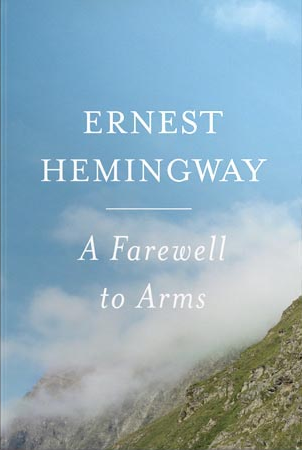Happy 4th of July, Everyone!

While WWI and the front is always in the background and weighing heavily on the characters, much of the focus is on Henry and his relationship with Nurse Catherine Barkley of Britain. When they meet, it seems as though both are contriving a romance out of thin air, and when Barkley’s past is revealed readers understand her desperation, though they may not like it.
“‘This is the third day. But I’m back now.’
She looked at me, ‘And you do love me?’
‘Yes.’
‘You did say you loved me, didn’t you?’
‘Yes,’ I lied. ‘I love you.’ I had not said it before.
‘And you call me Catherine?’
‘Catherine.’ We walked on a way and were stopped under a tree.
‘Say, “I’ve come back to Catherine in the night.”
‘I’ve come back to Catherine in the night.’
‘Oh, darling, you have come back, haven’t you?'” (page 30)
Henry is another matter, with the distant, first-person account of events in the past, readers will know little of how he makes decisions or how he feels unless he speaks aloud. In many ways, the reader must focus on what is not said to catch a glimmer of the hopelessness of his situation and the conviction he has in remaining with the Italian army even as it appears that they are losing the war. The silences of his mind and the things left unsaid in conversation make a surface reading of this novel inadequate (please check out Jeanne’s posts on this book from the read-a-long with War Through the Generations).
“I was afraid we would move out of the eddy and, holding with one hand, I drew up my feet so they were against the side of the timber and shoved hard toward the bank. I could see the brush, but even with my momentum and swimming as hard as I could, the current was taking me away. I thought then I would drown because of my boots, but I thrashed and fought through the water, and when I looked up the bank was coming toward me, and I kept thrashing and swimming in a heavy-footed panic until I reached it.” (Page 227)
There are moments where the supply shortages are noted, but there seems to be a never-ending supply of alcohol, which Henry uses to deal with the pain in his leg and the war that continues to rage on without an end. He loses friends, he loses his way, he must escape the enemy, and he must survive. There is desperation and scrambling for comfort and a sense of normalcy, but the hopelessness pervades everything in the novel and highlights the truth of war. Hemingway’s terse sentences, little insight into his main character, and the over-the-top antics and subservience of Barkley to Henry can get overwrought. However, in the latter portion of the novel there are moments of tenderness between Barkley and Henry are good to see and temper the uneasiness readers may feel about their relationship and its lack of depth.
A Farewell to Arms by Ernest Hemingway is a stark look at the emotional and psychological effects of war on soldiers, residents, and nurses, but it also raises questions about courage and bravery, whether peasants are beaten before they even enter the war, and how everyone, even the most dedicated, have a breaking point. Readers may find the novel plodding and ridiculous, and the characters distant and obnoxious at times, but with the threat of war at the backdoor, it must be hard to remain rational and unemotional. However, in this way, Henry’s actions often seem super-human, particularly during his knee surgery and other events.
Check out the read-a-long discussions for week 1, week 2, week 3, and week 4 at War Through the Generations.


 About the Band:
About the Band:




